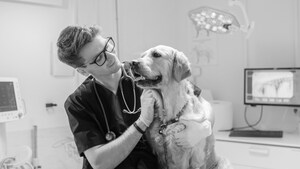Curiosity Can Save The Cat: Royal Canin Rallies Cat Owners To See The Vet This Year As Part Of A National Take Your Cat To The Vet Day Campaign
Royal Canin to donate cat food to shelters for every pledge to schedule a vet checkup
ST. CHARLES, Mo., Aug. 18, 2016 /PRNewswire/ -- Cats rule the Internet and our hearts – but veterinary visits for cats have fallen by 30 percent1 since 2001. In fact, only one cat is seen by a veterinarian for every five dogs2, despite the fact that 10 million more cats are owned in the United States.
"Cats are intelligent, inquisitive and comical companions, and cat professionals everywhere want to help people enjoy a happy and healthy lifelong relationship with them. Even though there are millions more pet cats than dogs in the US alone, the disparity of health care between cats and dogs - and perhaps that cats even need veterinary care- will surprise many people," said Jane Brunt, DVM, Executive Director of the CATalyst Council and owner of Cat Hospital At Towson in Maryland. "With the combined efforts of cat care professionals across veterinary, pedigreed cat and sheltering communities, cats will continue to delight our daily lives."
Inspired by the innate curiosity of cats, Royal Canin is supporting National Take Your Cat to the Vet Day on August 22 with a challenge to become more curious about our cats' health. The brand's "Curiosity Saved the Cat" campaign asks cat owners to pledge to see the vet this year by visiting www.royalcanin.com/Cat2VetDay and 'scratching' their name on the pledge list. For every pledge taken through August 26, Royal Canin will donate a bowl of food to the following animal shelters across the country: Second-Chance Rescue in Columbia, MO; All About Cats Rescue in Freeport, NY; and Young County Humane Society in Graham, TX.
To raise awareness and drive pledges, Royal Canin has produced a PSA video that features well-known YouTube cats lending their celebrity to the cause. Joining the brand in urging more attention to preventive veterinary care for cats are the American Association of Feline Practitioners, the CATalyst Council, The International Cat Association and the Cat Fanciers' Association.
Royal Canin Associates are walking the talk, as well. Royal Canin Associates, including USA President Keith Levy, are taking the pledge and making a trip to the vet with their cats the morning of National Take Your Cat to the Vet Day.
"There are millions of cats in the United States and half of those won't see a vet for preventive care this year. Veterinary visits are often overlooked by cat owners because we think of cats as independent, self-sufficient and healthy – but that's not the case," said Levy. "We are proud to partner with several leading organizations also committed to improving the lives of cats, so together, we can raise awareness about this important issue and get more cats to the vet this year."
To better understand pet owner's beliefs and motivations, Royal Canin recently commissioned a survey of more than 1,000 cat and dog owners; the survey revealed:
- Compared to dog owners, six times as many cat owners have not taken their cat to the vet this year
- Two-thirds of cat owners simply believe cats have fewer health issues than dogs
- The older a cat gets, the more likely the owner is to take her to the vet only when she is sick
- Thirty-one percent of those with a senior cat only take her to the vet when she is sick, compared to 20% for adult cats, 18% for adolescents and 17% for kittens
According to the American Association of Feline Practitioners, routine check-ups are important for a multitude of reasons:
- Routine wellness exams are vital for giving cats the long, happy and healthy lives they deserve
- Cats age much more rapidly than humans
- Cats are masters of hiding sickness and pain; for example, when a cat stops jumping as often, it could be a sign of pain or aging
- Vet visits are an opportunity to let your veterinarian know about any behavior changes
- Preventive care is better than reactive care
"Eighty-three percent of cats are taken to the veterinarian in the first year of ownership, yet over half of them don't return for another visit 3," said Colleen Currigan, DVM, President of the American Association of Feline Practitioners (AAFP). "This is a truly scary statistic especially given the fact that routine check-ups allow veterinarians to detect conditions that may affect a cat's health long before they become more significant, painful, and costly to treat. Preventive care check-ups for all cats should occur a minimum of once yearly, and more frequently for senior cats and those with chronic conditions," explains Dr. Currigan.
Trips to the vet are about more than just diagnosing an illness or helping with pain. Annual visits allow your veterinarian to monitor your cat's body weight and body condition scores. More than 50 percent of cats in America are overweight4, and according to the Royal Canin survey, nutrition is the No. 1 topic cat owners are interested in talking to a vet about. Royal Canin, a global leader in pet health nutrition, offers nutrition options for every stage of a cat's age, size, lifestyle and breed, which are essential to protecting the health and well-being of every cat.
Regular veterinary visits ensure that cats are up-to-date on all vaccinations, heartworm prevention, and flea and tick prevention. Annual visits are essential to maintaining health and wellbeing, but cat owners should be conscious of other factors that display the need for more frequent visits. Changes in appetite, water consumption, house-soiling, breathing and behavior patterns are all signs that your cat may need a check-up before his yearly visit.
In addition to asking you questions about your cat's medical history and behaviors, you can expect your veterinarian to evaluate the following areas with a physical examination:
- Vital signs, including temperature, heart rate and respiratory rate
- Teeth and the mouth, as tartar builds up and periodontal disease is common as cats age
- Ears and eyes
- Lymph nodes
- Skin and coat to check for fleas, ticks and changes in coat quality
- Muscles, bones and joints to check for discomfort
To learn more about Royal Canin, find a veterinarian or take the pledge, visit www.royalcanin.com/Cat2VetDay. Join the conversation on social by using hashtag #Cat2VetDay.
Survey Methodology
The 2016 Royal Canin survey of cat owners was conducted from June 20 - 23, 2016, with 1,001 cat owners and 213 dog owners for comparison purposes. The survey was fielded using the Research Now online opt-in consumer panel. At the time of the survey, participants had to reside in the 50 states or District of Columbia and be at least 18 years of age or older.
References
- AAHA Pets Matter, August 19, 2015: http://www.aaha.org/blog/petsmatter/post/2015/08/19/687773/Pet-health-Why-regular-veterinary-visits-matter.aspx
- Banfield State of Pet Health Report, 2016: http://www.banfield.com/Banfield/media/PDF/Downloads/soph/Banfield-State-of-Pet-Health-Report-2016.pdf
- Bayer Veterinary Care Usage Study III: Feline Findings http://www.bayerdvm.com/show.aspx/resources/feline-practitioners-resource-center/bayer-veterinary-care-usage-study
- Association for Pet Obesity Prevention, 2016: http://www.petobesityprevention.org/
ABOUT Royal Canin USA
Royal Canin USA is a leader in science-based cat and dog health nutrition. Founded by a veterinarian in 1968, Royal Canin has more than 40 years of experience in delivering individualized nutritional solutions. In collaboration with an expert team of nutritionists, breeders and veterinarians from around the world, Royal Canin places cats and dogs at the central point of the innovation process. The Royal Canin product line offers a range of diets based on size, age, breed, lifestyle and therapeutic requirements. Royal Canin diets are available at veterinary hospitals and pet specialty stores nationwide. Royal Canin is a subsidiary of Mars, Incorporated. To learn more about Royal Canin, visit www.royalcanin.com and "LIKE" us on Facebook at www.facebook.com/royalcanin.us.
ABOUT American Association of Feline Practitioners
The American Association of Feline Practitioners (AAFP) improves the health and welfare of cats by supporting high standards of practice, continuing education and scientific investigation. The AAFP has a long-standing reputation and track record in the veterinary community for facilitating high standards of practice and publishes guidelines for practice excellence which are available to veterinarians at the AAFP website. Over the years, the AAFP has encouraged veterinarians to continuously re-evaluate preconceived notions of practice strategies in an effort to advance the quality of feline medicine practiced. Launched in 2012, the Cat Friendly Practice® (CFP) program was created to improve the treatment, handling, and overall healthcare provided to cats. Its purpose is to equip veterinary practices with the tools and resources to reduce stress associated with the visit and elevate the standard of care provided to cats. Find more information at www.catvets.com.
ABOUT CATalyst Council
The CATalyst Council is a national organization which includes a wide variety of animal health and welfare organizations as well as corporate members of the animal health industry that are working together to improve the health and welfare of America's favorite pet. It was founded in response to troubling statistics released by the American Veterinary Medical Association that indicate an increase in our nation's pet cat population coupled with a decline in veterinary care for those cats. More information about the CATalyst Council is available at www.catalystcouncil.org.
ABOUT The International Cat Association
TICA™, The International Cat Association™ is the world's largest genetic registry of pedigreed and household pet cats, the first and now the world's largest–registry to allow household cats of unknown ancestry to compete for the same titles and awards as pedigreed cats. The responsible breeding of pedigreed cats preserves the distinct characteristics of individual pedigreed breeds and ensures the continuation of predictable physical and behavioral traits for future generations. TICA is headquartered in Harlingen, TX, and administers the rules licensing and management of hundreds of cat shows annually across the globe in 104 countries. TICA and its members work together to promote the preservation of pedigreed cats and the health and welfare of ALL domestic cats through education, responsible cat ownership, and proper care to the owners of millions of cats worldwide. TICA currently recognizes 63 breeds of cats. Wherever you are, you're in TICA's world. Fabulous felines…fun...and friendships. To learn about TICA www.tica.org
ABOUT Cat Fanciers' Association
The Cat Fanciers' Association, Inc. (CFA) was founded in 1906 as a not-for-profit association of member clubs and is the world's largest registry of pedigreed cats. CFA's mission is to preserve and promote the pedigreed breeds of cats and to enhance the well-being of ALL cats. CFA promotes education, responsible cat ownership and proper care to the owners of millions of cats worldwide. CFA and its affiliate clubs work nationally with local shelters to help humanely reduce homeless and feral cat populations and to encourage voluntary neuter/spay of pet cats. To learn more about the Cat Fanciers' Association, the pedigreed breeds of cats, or to find the nearest CFA cat show, visit the web site at www.cfa.org.
SOURCE Royal Canin
Related Links
WANT YOUR COMPANY'S NEWS FEATURED ON PRNEWSWIRE.COM?
Newsrooms &
Influencers
Digital Media
Outlets
Journalists
Opted In




Share this article